- Home
- Henry James
The Bostonians, Vol. I Page 2
The Bostonians, Vol. I Read online
Page 2
It was the same sort of impulse that had moved her to write to Basil Ransom, in the spring, after hearing accidentally that he had come to the North and intended, in New York, to practise his profession. It was her nature to look out for duties, to appeal to her conscience for tasks. This attentive organ, earnestly consulted, had represented to her that he was an offshoot of the old slave-holding oligarchy which, within her own vivid remembrance, had plunged the country into blood and tears, and that, as associated with such abominations, he was not a worthy object of patronage for a person whose two brothers—her only ones—had given up life for the Northern cause. It reminded her, however, on the other hand, that he too had been much bereaved, and, moreover, that he had fought and offered his own life, even if it had not been taken. She could not defend herself against a rich admiration—a kind of tenderness of envy—of any one who had been so happy as to have that opportunity. The most secret, the most sacred hope of her nature was that she might some day have such a chance, that she might be a martyr and die for something. Basil Ransom had lived, but she knew he had lived to see bitter hours. His family was ruined; they had lost their slaves, their property, their friends and relations, their home; had tasted of all the cruelty of defeat. He had tried for a while to carry on the plantation himself, but he had a millstone of debt round his neck, and he longed for some work which would transport him to the haunts of men. The State of Mississippi seemed to him the state of despair; so he surrendered the remnants of his patrimony to his mother and sisters, and, at nearly thirty years of age, alighted for the first time in New York, in the costume of his province, with fifty dollars in his pocket and a gnawing hunger in his heart.
That this incident had revealed to the young man his ignorance of many things—only, however, to make him say to himself, after the first angry blush, that here he would enter the game and here he would win it—so much Olive Chancellor could not know; what was sufficient for her was that he had rallied, as the French say, had accepted the accomplished fact, had admitted that North and South were a single, indivisible political organism. Their cousinship—that of Chancellors and Ransoms—was not very close; it was the kind of thing that one might take up or leave alone, as one pleased. It was "in the female line," as Basil Ransom had written, in answering her letter with a good deal of form and flourish; he spoke as if they had been royal houses. Her mother had wished to take it up; it was only the fear of seeming patronising to people in misfortune that had prevented her from writing to Mississippi. If it had been possible to send Mrs. Ransom money, or even clothes, she would have liked that; but she had no means of ascertaining how such an offering would be taken. By the time Basil came to the North—making advances, as it were—Mrs. Chancellor had passed away; so it was for Olive, left alone in the little house in Charles Street (Adeline being in Europe), to decide.
She knew what her mother would have done, and that helped her decision; for her mother always chose the positive course. Olive had a fear of everything, but her greatest fear was of being afraid. She wished immensely to be generous, and how could one be generous unless one ran a risk? She had erected it into a sort of rule of conduct that whenever she saw a risk she was to take it; and she had frequent humiliations at finding herself safe after all. She was perfectly safe after writing to Basil Ransom; and, indeed, it was difficult to see what he could have done to her except thank her (he was only exceptionally superlative) for her letter, and assure her that he would come and see her the first time his business (he was beginning to get a little) should take him to Boston. He had now come, in redemption of his grateful vow, and even this did not make Miss Chancellor feel that she had courted danger. She saw (when once she had looked at him) that he would not put those worldly interpretations on things which, with her, it was both an impulse and a principle to defy. He was too simple—too Mississippian—for that; she was almost disappointed. She certainly had not hoped that she might have struck him as making unwomanly overtures (Miss Chancellor hated this epithet almost as much as she hated its opposite); but she had a presentiment that he would be too good-natured, primitive to that degree. Of all things in the world, contention was most sweet to her (though why it is hard to imagine, for it always cost her tears, headaches, a day or two in bed, acute emotion), and it was very possible Basil Ransom would not care to contend. Nothing could be more displeasing than this indifference when people didn't agree with you. That he should agree she did not in the least expect of him; how could a Mississippian agree? If she had supposed he would agree, she would not have written to him.
III
When he had told her that if she would take him as he was he should be very happy to dine with her, she excused herself a moment and went to give an order in the dining-room. The young man, left alone, looked about the parlour—the two parlours which, in their prolonged, adjacent narrowness, formed evidently one apartment—and wandered to the windows at the back, where there was a view of the water; Miss Chancellor having the good fortune to dwell on that side of Charles Street toward which, in the rear, the afternoon sun slants redly, from an horizon indented at empty intervals with wooden spires, the masts of lonely boats, the chimneys of dirty "works," over a brackish expanse of anomalous character, which is too big for a river and too small for a bay. The view seemed to him very picturesque, though in the gathered dusk little was left of it save a cold yellow streak in the west, a gleam of brown water, and the reflexion of the lights that had begun to show themselves in a row of houses, impressive to Ransom in their extreme modernness, which overlooked the same lagoon from a long embankment on the left, constructed of stones roughly piled. He thought this prospect, from a city-house, almost romantic; and he turned from it back to the interior illuminated now by a lamp which the parlour-maid had placed on a table while he stood at the window as to something still more genial and interesting. The artistic sense in Basil Ransom had not been highly cultivated; neither (though he had passed his early years as the son of a rich man) was his conception of material comfort very definite; it consisted mainly of the vision of plenty of cigars and brandy and water and newspapers, and a cane-bottomed arm-chair of the right inclination, from which he could stretch his legs. Nevertheless it seemed to him he had never seen an interior that was so much an interior as this queer corridor-shaped drawing-room of his new-found kinswoman; he had never felt himself in the presence of so much organised privacy or of so many objects that spoke of habits and tastes. Most of the people he had hitherto known had no tastes; they had a few habits, but these were not of a sort that required much upholstery. He had not as yet been in many houses in New York, and he had never before seen so many accessories. The general character of the place struck him as Bostonian; this was, in fact, very much what he had supposed Boston to be. He had always heard Boston was a city of culture, and now there was culture in Miss Chancellor's tables and sofas, in the books that were everywhere, on little shelves like brackets (as if a book were a statuette), in the photographs and watercolours that covered the walls, in the curtains that were festooned rather stiffly in the doorways. He looked at some of the books and saw that his cousin read German; and his impression of the importance of this (as a symptom of superiority) was not diminished by the fact that he himself had mastered the tongue (knowing it contained a large literature of jurisprudence) during a long, empty, deadly summer on the plantation. It is a curious proof of a certain crude modesty inherent in Basil Ransom that the main effect of his observing his cousin's German books was to give him an idea of the natural energy of Northerners. He had noticed it often before; he had already told himself that he must count with it. It was only after much experience he made the discovery that few Northerners were, in their secret soul, so energetic as he. Many other persons had made it before that. He knew very little about Miss Chancellor; he had come to see her only because she wrote to him; he would never have thought of looking her up, and since then there had been no one in New York he might ask about her. Therefore he could only guess th
at she was a rich young woman; such a house, inhabited in such a way by a quiet spinster, implied a considerable income. How much? he asked himself; five thousand, ten thousand, fifteen thousand a year? There was richness to our panting young man in the smallest of these figures. He was not of a mercenary spirit, but he had an immense desire for success, and he had more than once reflected that a moderate capital was an aid to achievement. He had seen in his younger years one of the biggest failures that history commemorates, an immense national fiasco, and it had implanted in his mind a deep aversion to the ineffectual. It came over him, while he waited for his hostess to reappear, that she was unmarried as well as rich, that she was sociable (her letter answered for that) as well as single; and he had for a moment a whimsical vision of becoming a partner in so flourishing a firm. He ground his teeth a little as he thought of the contrasts of the human lot; this cushioned feminine nest made him feel unhoused and underfed. Such a mood, however, could only be momentary, for he was conscious at bottom of a bigger stomach than all the culture of Charles Street could fill.
Afterwards, when his cousin had come back and they had gone down to dinner together, where he sat facing her at a little table decorated in the middle with flowers, a position from which he had another view, through a window where the curtain remained undrawn by her direction (she called his attention to this—it was for his benefit), of the dusky, empty river, spotted with points of light—at this period, I say, it was very easy for him to remark to himself that nothing would induce him to make love to such a type as that. Several months later, in New York, in conversation with Mrs. Luna, of whom he was destined to see a good deal, he alluded by chance to this repast, to the way her sister had placed him at table, and to the remark with which she had pointed out the advantage of his seat.
"That's what they call in Boston being very 'thoughtful,'" Mrs. Luna said, "giving you the Back Bay (don't you hate the name?) to look at, and then taking credit for it."
This, however, was in the future; what Basil Ransom actually perceived was that Miss Chancellor was a signal old maid. That was her quality, her destiny; nothing could be more distinctly written. There are women who are unmarried by accident, and others who are unmarried by option; but Olive Chancellor was unmarried by every implication of her being. She was a spinster as Shelley was a lyric poet, or as the month of August is sultry. She was so essentially a celibate that Ransom found himself thinking of her as old, though when he came to look at her (as he said to himself) it was apparent that her years were fewer than his own. He did not dislike her, she had been so friendly; but, little by little, she gave him an uneasy feeling—the sense that you could never be safe with a person who took things so hard. It came over him that it was because she took things hard she had sought his acquaintance; it had been because she was strenuous, not because she was genial; she had had in her eye—and what an extraordinary eye it was!—not a pleasure, but a duty. She would expect him to be strenuous in return; but he couldn't—in private life, he couldn't; privacy for Basil Ransom consisted entirely in what he called "laying off." She was not so plain on further acquaintance as she had seemed to him at first; even the young Mississippian had culture enough to see that she was refined. Her white skin had a singular look of being drawn tightly across her face; but her features, though sharp and irregular, were delicate in a fashion that suggested good breeding. Their line was perverse, but it was not poor. The curious tint of her eyes was a living colour; when she turned it upon you, you thought vaguely of the glitter of green ice. She had absolutely no figure, and presented a certain appearance of feeling cold. With all this, there was something very modern and highly developed in her aspect; she had the advantages as well as the drawbacks of a nervous organisation. She smiled constantly at her guest, but from the beginning to the end of dinner, though he made several remarks that he thought might prove amusing, she never once laughed. Later, he saw that she was a woman without laughter; exhilaration, if it ever visited her, was dumb. Once only, in the course of his subsequent acquaintance with her, did it find a voice; and then the sound remained in Ransom's ear as one of the strangest he had heard.
She asked him a great many questions, and made no comment on his answers, which only served to suggest to her fresh inquiries. Her shyness had quite left her, it did not come back; she had confidence enough to wish him to see that she took a great interest in him. Why should she? he wondered, He couldn't believe he was one of her kind; he was conscious of much Bohemianism—he drank beer, in New York, in cellars, knew no ladies, and was familiar with a "variety" actress. Certainly, as she knew him better, she would disapprove of him, though, of course, he would never mention the actress, nor even, if necessary, the beer. Ransom's conception of vice was purely as a series of special cases, of explicable accidents. Not that he cared; if it were a part of the Boston character to be inquiring, he would be to the last a courteous Mississippian. He would tell her about Mississippi as much as she liked; he didn't care how much he told her that the old ideas in the South were played out. She would not understand him any the better for that; she would not know how little his own views could be gathered from such a limited admission. What her sister imparted to him about her mania for "reform" had left in his mouth a kind of unpleasant aftertaste; he felt, at any rate, that if she had the religion of humanity—Basil Ransom had read Comte, he had read everything—she would never understand him. He, too, had a private vision of reform, but the first principle of it was to reform the reformers. As they drew to the close of a meal which, in spite of all latent incompatibilities, had gone off brilliantly, she said to him that she should have to leave him after dinner, unless perhaps he should be inclined to accompany her. She was going to a small gathering at the house of a friend who had asked a few people, "interested in new ideas," to meet Mrs. Farrinder.
"Oh, thank you," said Basil Ransom. "Is it a party? I haven't been to a party since Mississippi seceded."
"No; Miss Birdseye doesn't give parties. She's an ascetic."
"Oh, well, we have had our dinner," Ransom rejoined, laughing.
His hostess sat silent a moment, with her eyes on the ground; she looked at such times as if she were hesitating greatly between several things she might say, all so important that it was difficult to choose.
"I think it might interest you," she remarked presently. "You will hear some discussion, if you are fond of that. Perhaps you wouldn't agree," she added, resting her strange eyes on him.
"Perhaps I shouldn't—I don't agree with everything," he said, smiling and stroking his leg.
"Don't you care for human progress?" Miss Chancellor went on.
"I don't know—I never saw any. Are you going to show me some?"
"I can show you an earnest effort towards it. That's the most one can be sure of. But I am not sure you are worthy."
"Is it something very Bostonian? I should like to see that," said Basil Ransom.
"There are movements in other cities. Mrs. Farrinder goes everywhere; she may speak to-night."
"Mrs. Farrinder, the celebrated——?"
"Yes, the celebrated; the great apostle of the emancipation of women. She is a great friend of Miss Birdseye."
"And who is Miss Birdseye?"
"She is one of our celebrities. She is the woman in the world, I suppose, who has laboured most for every wise reform. I think I ought to tell you," Miss Chancellor went on in a moment, "she was one of the earliest, one of the most passionate, of the old Abolitionists."
She had thought, indeed, she ought to tell him that, and it threw her into a little tremor of excitement to do so. Yet, if she had been afraid he would show some irritation at this news, she was disappointed at the geniality with which he exclaimed:
"Why, poor old lady—she must be quite mature!"
It was therefore with some severity that she rejoined:
"She will never be old. She is the youngest spirit I know. But if you are not in sympathy, perhaps you had better not come," she went on.
"Yes, but every one will, in his way—or in her way—plead the cause of the new truths. If you don't care for them, you won't go with us."
"I tell you I haven't the least idea what they are! I have never yet encountered in the world any but old truths—as old as the sun and moon. How can I know? But do take me; it's such a chance to see Boston."
"It isn't Boston—it's humanity!" Miss Chancellor, as she made this remark, rose from her chair, and her movement seemed to say that she consented. But before she quitted her kinsman to get ready, she observed to him that she was sure he knew what she meant; he was only pretending he didn't.

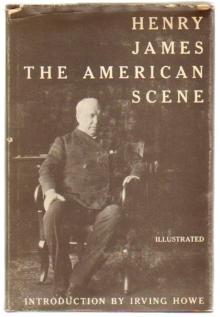 The American
The American The Wings of the Dove, Volume 1 of 2
The Wings of the Dove, Volume 1 of 2 Frost at Midnight
Frost at Midnight Morning Frost
Morning Frost The Portrait of a Lady — Volume 1
The Portrait of a Lady — Volume 1 Fatal Frost
Fatal Frost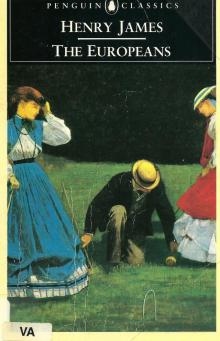 The Europeans
The Europeans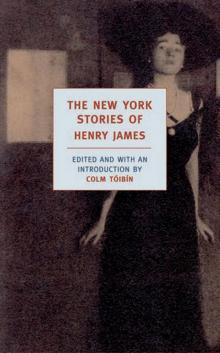 The New York Stories of Henry James
The New York Stories of Henry James Great Short Novels of Henry James
Great Short Novels of Henry James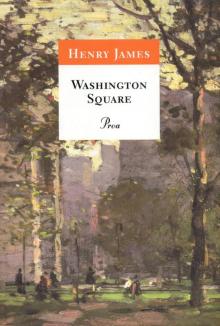 Washington Square
Washington Square The Portrait of a Lady — Volume 2
The Portrait of a Lady — Volume 2 The Ambassadors
The Ambassadors The Wings of the Dove
The Wings of the Dove The Princess Casamassima (Classics)
The Princess Casamassima (Classics) The Coxon Fund
The Coxon Fund First Frost
First Frost Henry James
Henry James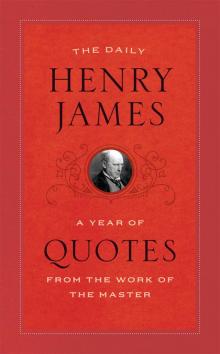 The Daily Henry James
The Daily Henry James Travels With Henry James
Travels With Henry James The Reverberator: A Novel
The Reverberator: A Novel What Maisie Knew (Henry James Collection)
What Maisie Knew (Henry James Collection)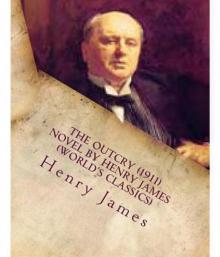 The Outcry
The Outcry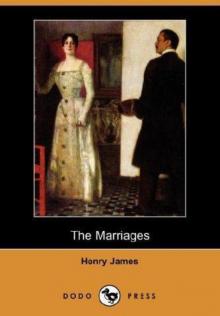 The Marriages
The Marriages The Wings of the Dove, Volume 2
The Wings of the Dove, Volume 2 The Bostonians, Vol. I
The Bostonians, Vol. I The Outcry: -1911
The Outcry: -1911 The Complete Works of Henry James
The Complete Works of Henry James Letters from the Palazzo Barbaro
Letters from the Palazzo Barbaro The Pupil
The Pupil The Bostonians, Vol. II
The Bostonians, Vol. II Pandora
Pandora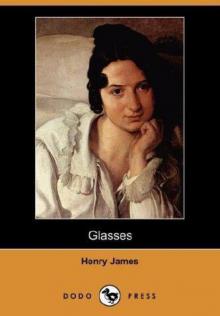 Glasses
Glasses The Princess Casamassima
The Princess Casamassima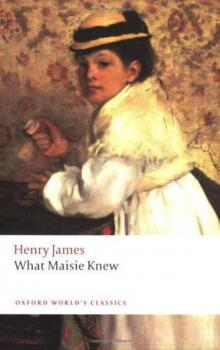 What Maisie Knew
What Maisie Knew The Reverberator
The Reverberator The Golden Bowl - Complete
The Golden Bowl - Complete Confidence
Confidence Wings of the Dove (Barnes & Noble Classics Series)
Wings of the Dove (Barnes & Noble Classics Series) The Spoils of Poynton
The Spoils of Poynton